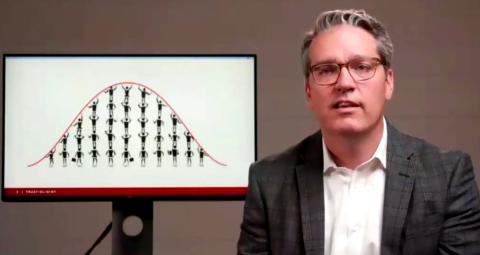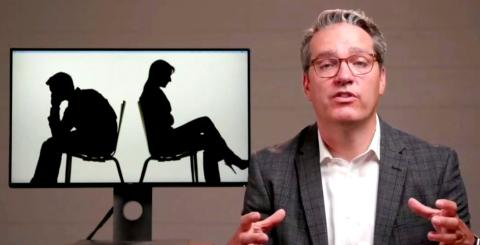Give It to Get It
Fagerlin Discusses Economics and Value of Trust

Back when people used to work in offices and reported to bosses and interacted with coworkers—a state that, it is said, will come again—trust was a key component in moving things forward.
Speaking, virtually, on the topic of trust at a time when it is hard to come by amid societal unrest and a pandemic, Richard Fagerlin, founder and president of Peak Solutions, gave the third talk in the Deputy Director for Management Seminar Series on June 4.
Although his talk was scheduled long before trust was elevated to a crucial national concern—Do we trust the police? Do we trust vaccines?—Fagerlin acknowledged the weight of the moment.
“The times we’re in right now make trust more important than ever before,” he said. “This presentation is absolutely just in time.”
For the last 20 years, the Edelman public relations firm has compiled a Global Trust Report, said Fagerlin. In 2020, its focus is competence and ethics.
“No organizations were found both competent and ethical in 2020,” he said. “Trust is at an all-time low in the systems they examined.”
But the three most trusted occupations in America this year are doctor, scientist and national health official.
“That’s powerful,” said Fagerlin, “because every one of you fits. You are the most trusted people on the planet. You have been placed in the highest position, which has never been the case in the history of time…The whole world’s eyes are upon you.”
But it’s easy to slip when, given any set of circumstances—say, the importance of wearing masks in public—30-40 percent of the public will interpret the same set of facts totally differently.
“These are unprecedented times,” said Fagerlin. “We’re all tired of hearing about it, but it’s true. These are heavy, scary, difficult times, but historic times, too. Mostly these are revealing times. We show more of who we are under pressure. Pressure makes us more of who we already were.”
With our beliefs and principles put daily to the test, Fagerlin suggests examining the polarities and tensions they reveal.
For example, we all want a boss who is clear. But we also want flexibility.
“There’s a tension between those two values,” said Fagerlin. “Each one is the downside of the other.”
But just as breathing requires both inhaling and exhaling—unless you want to suffocate—there needs to be a balance between the two.
Another example: Flattening the curve by staying home vs. killing the economy.
“The point of tension isn’t deciding what’s right or wrong, but in admitting what the factors are—safety is paramount in this instance—and learning to manage them,” Fagerlin suggests. “The goal is not to solve a problem, but to manage tensions.”

This often involves abandoning the either/or mindset and welcoming both/and, he said. There is an upside to tension, and the best leaders know better than to resolve all of it. Respect, empathy and an open mind are a leader’s best allies in tight situations.
Leaders, by the way, are not necessarily the experts, or the most senior people. Rather they are problem-solvers who can negotiate obstacles, often by accruing trust due to having extended it to others in the past.
Fagerlin says workplace culture is “the sum of what you permit and what you promote.” The best cultures emphasize the latter, which tends to be more positive than a set of strictures and thou-shalt-nots.
Two lies work against a culture of trust, he said: Trust is earned over time, and trust takes a lifetime to earn, but only a second
to lose.
Throw away the scorecard, urged Fagerlin. When mistrust emerges between two parties, both often think they’ve gone halfway to meet the other. “It’s the first step past halfway that impresses me the most,” he said.
“Trust isn’t what you earn, it’s something you give. If you don’t give it, you’ll never get it.”
Fagerlin isn’t calling for blind trust or ignorance; there are people who will take advantage of you, but the percentage is small, and the gains of trusting far outweigh the occasional downside, he argued.
Trust is a stool with three legs, he posited: integrity, competence and compassion.
“Integrity is more than honesty,” he explained. “It comes from the same word as integer, or whole number. It’s a wholeness, a consistency of self.”
Competency, he said, is the ability to acquire knowledge, but more crucially, “to be able to broker that knowledge to other people.”
Compassion, he admitted, “is the most difficult. It requires a pure understanding of where people are coming from. You’ve got to be able to rejoice when people are rejoicing and grieve when they are grieving.
“If you have all three of these characteristics, you have trust.”
Interestingly, whichever of the stool legs is most important to you is likely to be the one you most unfairly judge others by,
he said.
“We tend to overvalue what’s important to us,” Fagerlin noted. “Remember, you can inhale too much and end up out of balance.”
He concluded with three suggestions for getting past the halfway point in building a relationship of trust.
- “Everyone needs CPA,” he declared: I cause…I participate…I allow. “This is the coat of arms of our various cultures. We need to take ownership.”
- Always assume positive intent. “I judge myself on my intentions. But I judge others on their actions…Take the risk to assume a positive intention.”
- Be offensive, or willing to offend others. Fagerlin admits that feelings of offense are at an all-time high and cautioned against being a bully. He emphasized “candor with care” in order to be real, authentic and vulnerable. “As the saying goes, wounds from a brother are better than a kiss from an enemy.”
He touted the model of servant leadership: “Lift up others so they can be great. Do the right thing. Ask every day, ‘What’s needed from me right now?’”
And have the humility to forgive others when things go awry. “Choose courage over comfort in taking the first step toward reconciliation.”
During a brief Q&A moderated by NIH deputy director for management Dr. Alfred Johnson—who issued Fagerlin a standing invitation to visit NIH once travel restrictions abate—Fagerlin acknowledged that some employees must cope with malignant narcissism in bosses.
“Don’t let people live rent-free in your brain,” he counseled. “Don’t let them take more energy than they deserve.” He also pointed out that sometimes “there are necessary endings.”
Two final nuggets: clear expectations coupled with immediate and regular feedback are the most motivating factors in the workplace. And when change comes, only three people like it—if they’re in charge, if they implement it, or if they benefit by it.
“It sucks for everyone else!” he said.
The full lecture is available at https://videocast.nih.gov/watch=35467.
